Maratua to Manado
On the 16 Sept 24 we left Maratua (and the end of our Borneo stint) and did an overnight sail to Pindjang on northern Sulawesi. This was a good boisterous sail averaging 25 knots gusting 30 and at times rough seas. Wind was mainly just forward of the beam and we put Kanaloa through her paces averaging about 6.5- 7 knots into a black moonless night. Night sailing without a moon is no different to sailing with a blindfold on. You can see bugger all but thankfully there were no other boats to be seen either by eye or AIS. A very different motion on 26 tonnes of boat compared to Mustangs 10 tonnes. Warren surprised me by taking it fairly easy though, you just don’t need a damaged boat in this part of the world.
We anchored at Pindjang, our first stop in Sulawesi, and ourselves and 9 Lives went for a recce to the village. This area is renown for its clove groves, and we were met with the beautiful smell of cloves drying on ground sheets throughout the town. The houses on the shore were very basic but nevertheless still sported the mandatory satellite dish .
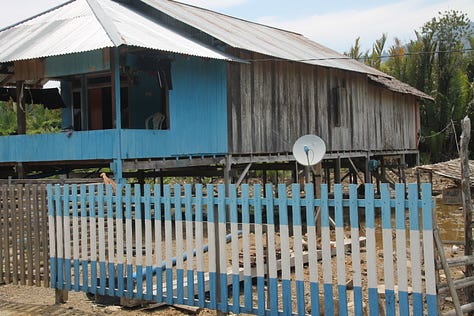
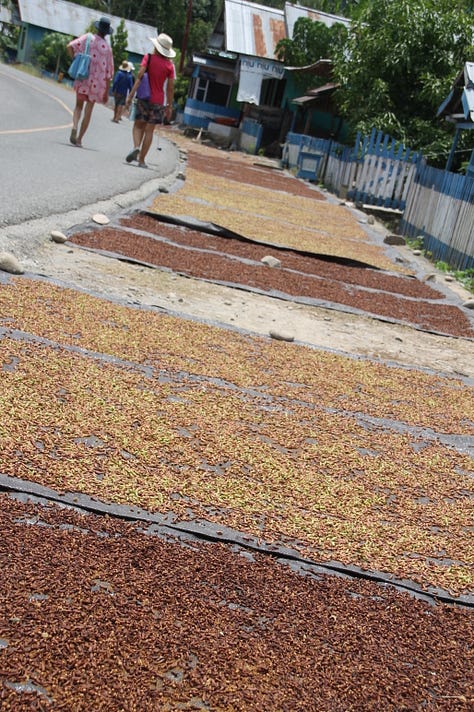
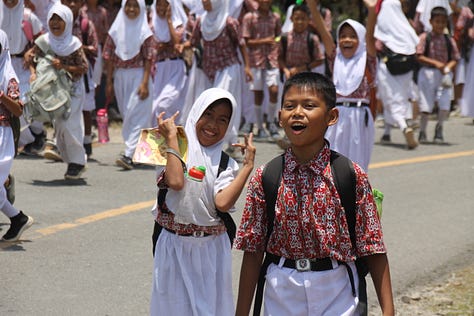
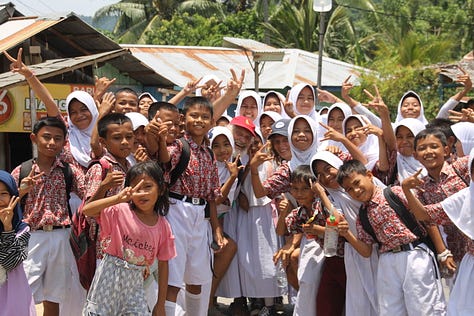
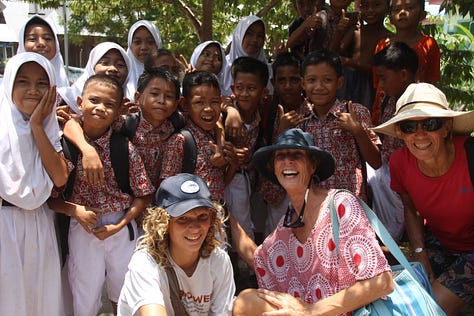
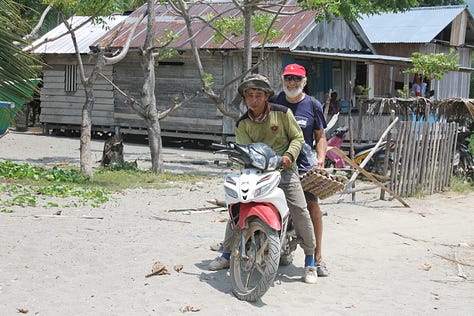
Clockwise:spot the satellite dish; cloves; happy school kids; morg and warren in there somewhere; warren arriving with the eggs.
It was a hot 2km walk into town to a very warm welcome from the locals. We were greeted with the usual ‘hey mister’ regardless of sex and hundreds of requests for selfies.
I’m guessing we may have been the only foreigners to have visited these shores in a very long time. We arrived just as school was finishing and were swarmed by kids. Happy, laughing, cheeky kids, just as they should be. They were beautifully dressed in their school uniforms and followed us all the way back to the beach while we stopped from time to time to buy bananas and eggs. The one outstanding feature of this town was its lack of rubbish, not sure why but it was a lot cleaner then most of the other villages we have visited, it seemed that these people were proud of their town.
The next day we departed for Buol, a town of about 10,000 people, and in stark contrast to Pindjang, we landed on a beach with more trash then sand. We were in need of a fresh fruit market, so Morgan and I braved the smelly drains and piles of rubbish. We were joined by a band of five kids. The girl, who was probably about 10 took it upon herself to be our guide. With the limited Bahasa (Indonesian) I know, I explained that we were in the need for fruit and vegges. She promptly took us to a small fruit shop with limited choice, so I did my best impression of a market, and low and behold, a motorbike was summoned and Morgan and I piled on to the two seats attached to the front of the bike, ready for market. I said goodbye and thank you to our guide, but she just grinned and hopped onto the foot board in front of us. I turned around and saw that a couple of boys had also attached themselves to the driver and running boards. They were not going to let us go. Turned out to be lucky actually, as we had no idea of how to get back to the beach through the maze of houses and alleys. Our trusty guide came through with flying colours and was rewarded handsomely in rupiers. The last video has a shot of her on our bike trip to market.
Back at the beach, as we were waiting for Giovanni to come and pick us up in the dinghy, Morgan and I we surrounded by a few very scary looking old women, with no teeth, or if they had one left it was red from beetle nut, and thick glasses that had probably been passed down through the generations. More and more of them with freshly applied lipstick came down to the beach for a photo opportunity. As soon as we saw Giovanni arrive, Morg and I ran the hundred meters to the dingy with all of our shopping in under 9.84 seconds. It was kind of a surreal place that town.
Glad to be on our way, we departed the next day with an overnight anchor in Malangato. At this stage we were still travelling with 3 catamarans; 9 Lives with Mark and Jane aboard, Mariposa (the crazy German) and Ananda with an American couple on board. If you have read our blogs from years ago we were good friends with Ananda’s previous owners who had a wee girl Millie, Morg and Millie were great friends for the years we spent mooching around Thailand.
There are not a lot of cruising boats in these waters so even though the idea is to be totally independent it is nice to be able to swap stories- discuss boat problems and have a collective of spare parts from 4 boats. Plus the fact that that the people themselves are great company. For those of you not accustomed to boats , there is an endless list of breakdowns to be fixed, maintenance to be done and cleaning. Its nearly a daily occurrence that something on the boat has stopped working, jammed or clogged up. Little leaks are always there, as the boat houses a labyrinth of pumps, hoses and wiring. And the fun starts when they turn into big leaks.
Then there’s the engine, batteries, the electrical system, the fridges freezers, winches, windlasses, sails, dinghy, outboards, water maker……………………………………………….all needing R&M.
We stopped for a few hours enroute to Seronde at Palau Popaya, just because it looked so spectacular and we had to jump in for a snorkel. So here we are at a very remote island, no resorts or village of any description, but look at the clip below so you too can share my depression about the rubbish on an otherwise perfect spot in paradise.
Our next anchorage was Lito Seronde which was in the middle of the northern Sulawasi arm where we were joined by all the aforementioned cruising boats Another spectacular anchorage with a boutique resort owned by a German couple who welcomed us to use the facilities. The resorts we visit are very small-10 12 bures-low key places based around snorkeling and diving. As far removed from a Musket Cove as you could get. We had lovely happy hour drinks, great food and the occasional massage.
As we move further east there is a definite Papuan influence among the people-frizzy hair, darker skin and big brown eyes. The children are just gorgeous. Christianity is more common here and the atmosphere feels more relaxed and happy. The resort staff would play guitar and sing in the evenings and it was hard not to think we were back in Fiji. Needless to stay we stayed here for a couple of days chilling. It is so easy to spend a week or more at these places but we needed to reach Manado at the eastern end of Sulawesi to renew our visas in time.
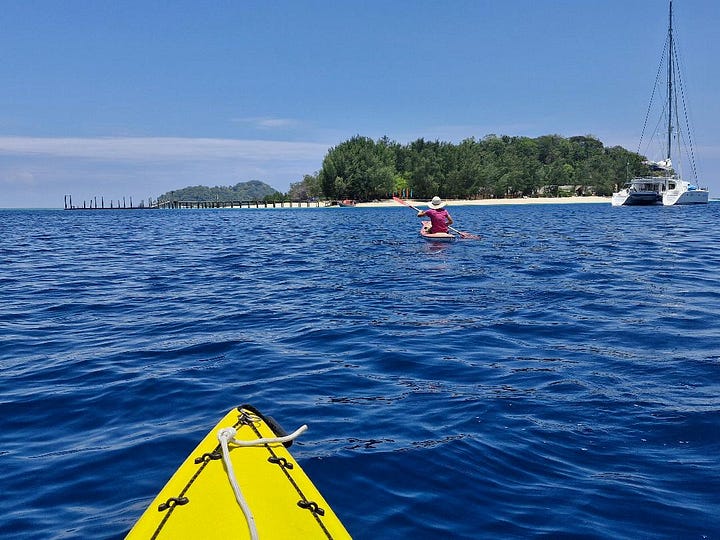
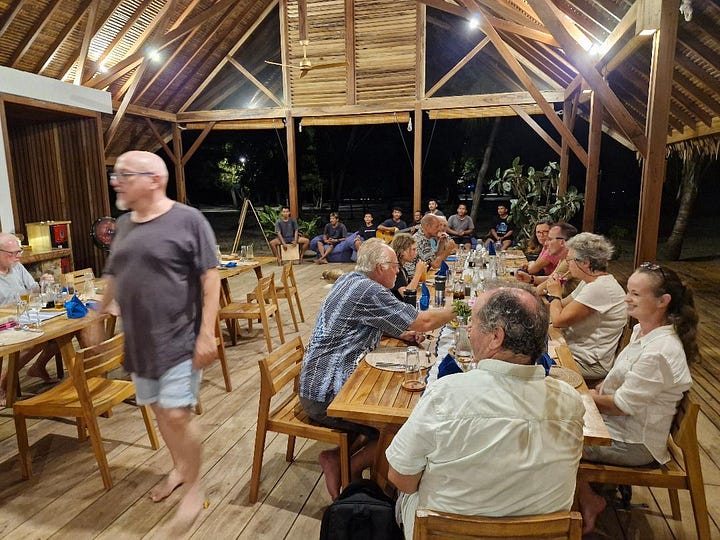
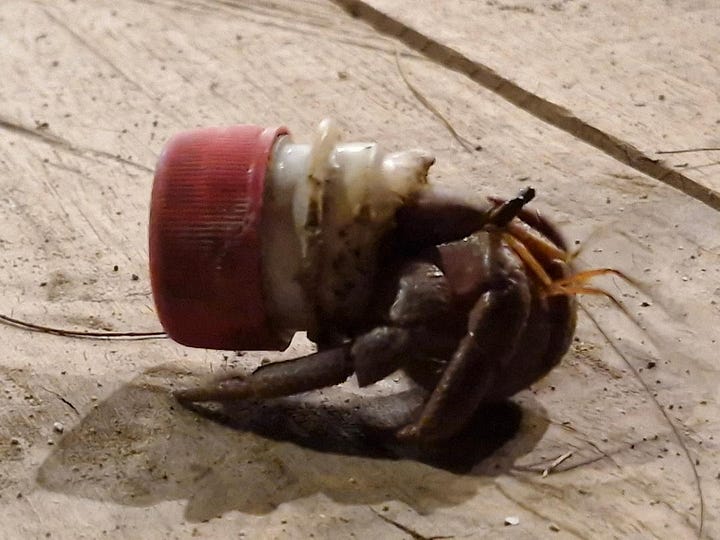
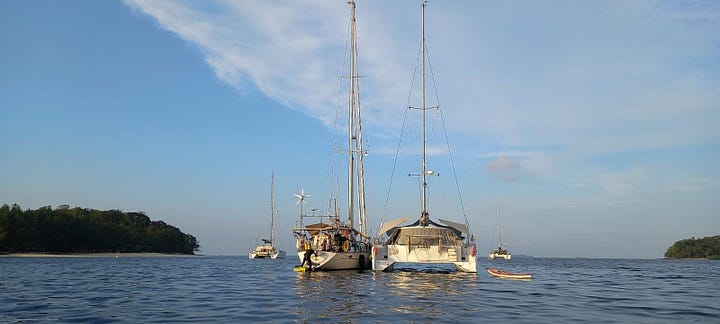
Clockwise: Jane and I paddling in for our morning coffee at Seronde. Dinner with the rest of the cruisers. Hermit crab finds prime piece of real estate. The Trimaran-Kanaloa and 9 Lives rafted.
We left Seronde on the 25 Sept with an overnight stop at at Labuna Uki . We arrived in Manado (the capital of North Sulawesi) anchoring outside a small harbour in deep, but unusually clear water for a city anchorage.
It was so clear that inside the harbour you can clearly see a sunken ferry a few meters under the surface.
Manado has a pop of about 500 000. The Dutch East India Co had a big presence here in the 1600’s, and the influence of the Dutch missionary’s is seen by the predominantly christian population. It is a relatively wealthy town compared to the others we have visited on the way.
Jane and I took advantage of a few supermarkets here, having an interesting ride in the local taxi-see below. The supermarkets in SE Asia and a bit different to what we are used to and sometimes it can take a whole day to source a few special dietary requirements, such as meat (that would be chicken and the odd bit of beef or pork if you’re lucky) tonic water and beer.
We went for a mini tour around Manado in a beautiful, new air conditioned mini van. This was what we were told we were getting. Instead we got a rusty old banger with no air con, no suspension, windows that needed a crowbar to open, and seats that were perfect for people under 3 feet.
After a 3 hour wait for ‘the’ promised van in the morning which for whatever reason didn’t turn up, the guy managed to secure the above shit bucket and we were off. Up to the mountain village of Tomohon, 53 kms from Mandano. This town has an infamous wet market that sells cat, dog and various other delicacies as well as using barbaric slaughter methods and has been described as a cafeteria for animal pathogens. Nice. Criticism from celebrities supposedly resulted in a ban of these products in July 2023 by the town mayor.
Thankfully it was a Sunday and the market was very quiet when we visited. There wasn’t much flesh on offer, but the remains of slaughtering were evident in the big red puddles we long jumped over and the over riding stench of dead things. Not sure if there is still a black market for domestic pets, however the absence of four legged furballs in the town didn’t go unnoticed by us in the van. We also had lunch at a local restaurant, I chose vegetarian.
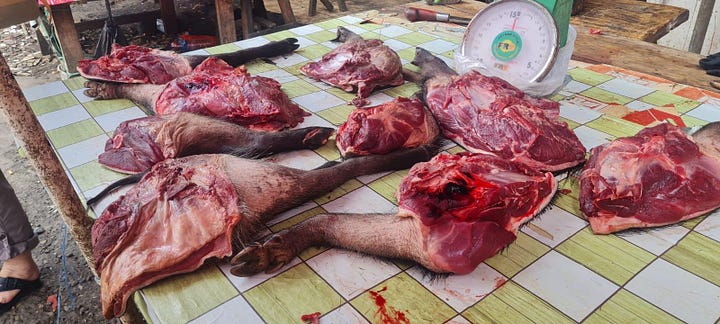
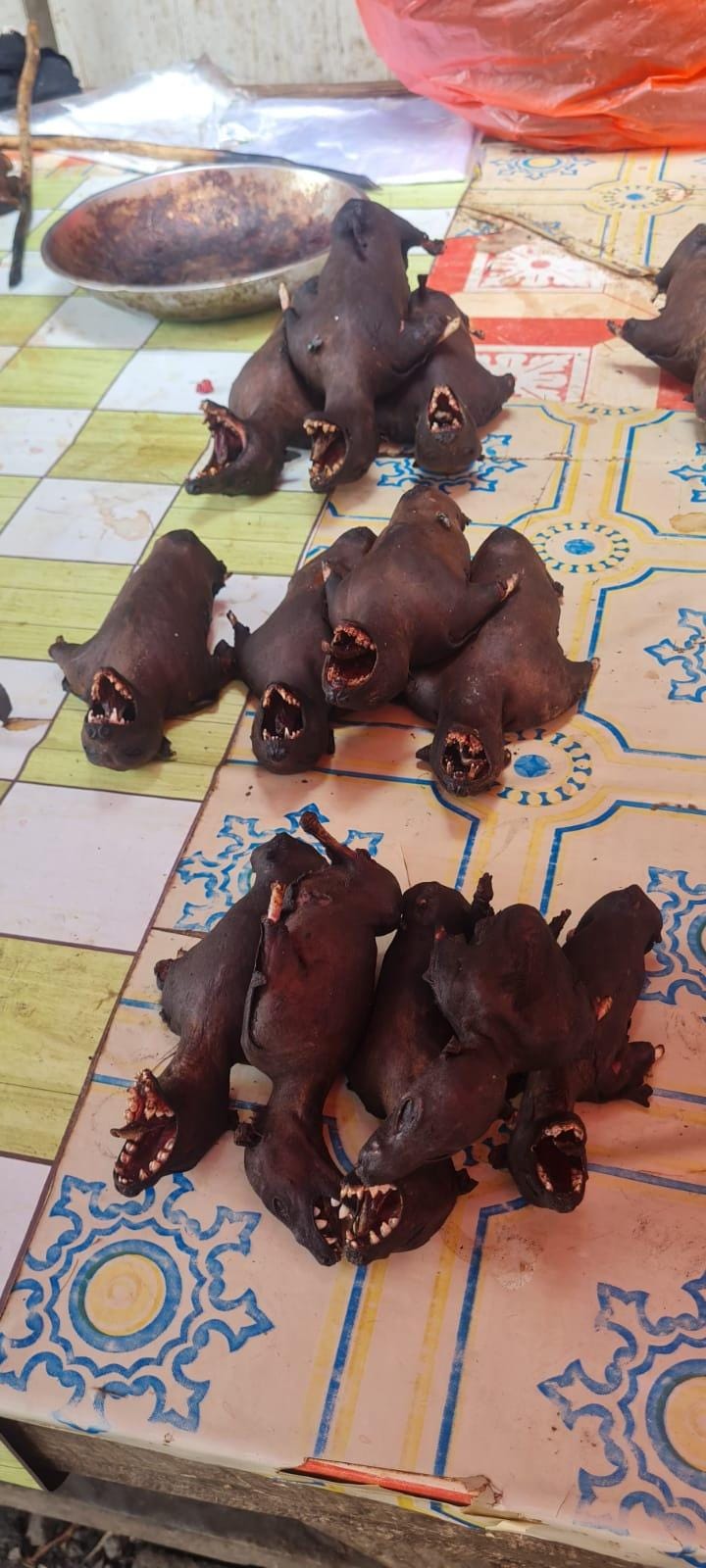
The meat department at Tomohon. Believe it or not these ugly things on the right are bats. Yes, bats. Yum yum.
We visited the crater at the top of Manado and zig zagged down to a pretty uninspiring lake to the east somewhere. Then zig zagged back up and down to Manado. Morg was wise as he opted to stay on the boat for this tour as it wasn’t the most exciting.
We also had to get our visas renewed here, what we thought would be a few hours at immigration-what were we thinking. After we handed over all the documentation we were told it would take 3 days to process. So instead of waiting in Manado we motored across to the island of Bunaken about 20 miles north. This is beautiful place with pretty good coral and neat little villages. We picked up a mooring and spent a few days mooching and roaming the villages. No cars here, just the transport in the video below. The whole place had a laid back,”manana” feel to it. Bliss.
Above video:The Streets of Bunaken.
We then picked up our visas as promised and departed for the next leg of our journey to Maluku. See you soon!


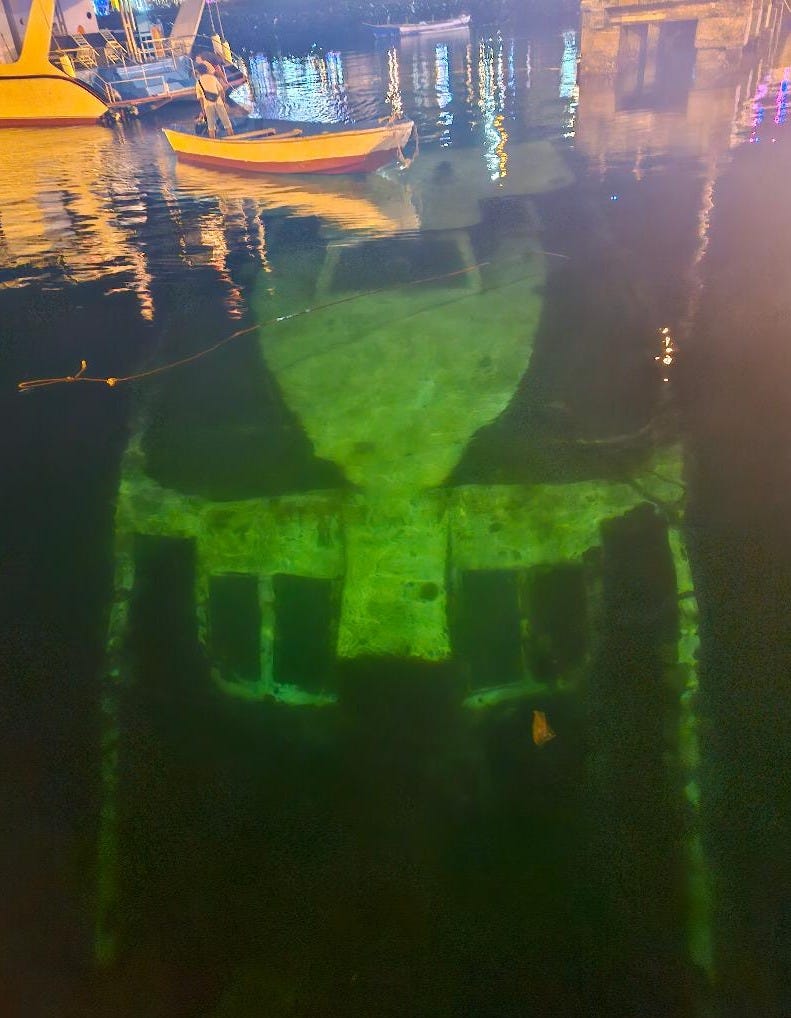
What a life!! Tough at the top, so they say.
As always a great read Trish. And too loved the photos and videos. Huge thanks for sharing your travels.
So good to have news! Bri tells me she last corresponded with Morg for his birthday. So good to see all the smiling faces and soooo sad about the rubbish but we are very familiar with it. The hermit crab with a plastic lid on the bum is a classic. I have unfortunately seen this in other areas of the world. Indo is particularly affected by plastics mostly because of the lack of education and the fishing community that has zero understanding. But even when we arrived the young ones seemed to be more aware - which didn't stop the oldies going to the beach every morning and dumping their rubbish at low tide. Such sad state of affairs. Gosh we miss you guys! Hope to see you soon.